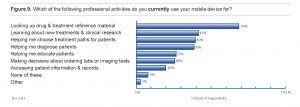QuantiaMD’s survey confirms that physicians will increasingly seek real-time connectivity and consultation with medical laboratory service providers
Physicians are quickly becoming fans of mobile computing. Clinical laboratory managers and pathologists will be interested to learn that, in fact, mobile computing is taking hold among physicians faster than in the general population.
This was one conclusion from a recent survey, according to an article in Healthcare Informatics. QuantiaMD, a Waltham, MA-based mobile and online physician community, conducted a survey of 3,798 physicians. More than 80 % of the respondents said they own a mobile device capable of downloading applications. That means that a far higher percentage of physicians are using mobile devices than among the general public.
For the 80% of physicians using a mobile computing device, brand preference was as follows: 59 % iPhone, 29 % iPad, 20 % Android smartphone, 14 % BlackBerry, 3 % Android tablet, with 7% choosing other brands, as reported in the Healthcare Informatics article. Many physicians had more than one mobile device. A full 44 % of physicians who participated in the survey said they intended to buy a mobile device this year.
Mark Musco, M.D, Chief Medical Information Officer (CMIO) at Muir Medical Group IPA, based in Walnut Creek, California, is a user of mobile computing devices. He realized several years ago that mobile computing could allow him to be connected to his practice and, yet, be “untethered” from a fixed workstation.
Now, Musco says he does everything—from coordinating care and taking calls to updating patient’s status with another provider—using mobile computing. “[A] lot of what I’m doing is via text-messaging now,” he noted.
As CMIO, Musco spends two days a week helping the organization’s 700+ physicians to facilitate the “anytime-anywhere computing capabilities environment they need,” the article stated.
Two days a week, Musco, who is a family physician, practices at his own three-doctor, one-physician assistant office practice. “All the people [at the office] with direct patient care responsibilities are mobile,” Musco declared. He indicated that the practice uses tablets for core clinical documentation and other functions.
Four Things Physicians Want
According to Musco, there are four things that physicians want in mobile computing:
- affordability;
- instantaneous connectivity to ancillary services and other providers;
- ease of use of platforms and devices relative to their particular clinical needs; and,
- assurance that any deployed instruments help meet evolving mandates or requirements, such as those related to meaningful use, healthcare reform, or managed care needs.
“Physicians want an affordable, efficient way to be connected to a community of doctors collaborating and coordinating care on an e-community kind of platform,” Musco explained.
With 3,141 physicians responding to this question in the QuantiaMD survey of mobile computing, “making decisions about ordering labs or imaging tests” ranked sixth. Pathologists and clinical laboratory managers will understand that this is a somewhat misleading question. “Making decisions about ordering” is not the same as “using my mobile computing device to order clinical laboratory tests and view laboratory test results.” It is the experience of many medical laboratories that physicians using smartphones and iPads generally want to be able to view the patients’ lab test results on these devices. (Graphic copyright QuantiaMD.)
Healthcare’s move toward total computer mobility has its challenges, Healthcare Informatics reported. Cost, implementation scheduling, prioritization, and return-on-investment (ROI) are factors that could discourage increased use of mobile computing by physicians.
Health Organizations Footing The Bill For Doctors’ Mobile Devices
The survey also found that growing numbers of institutions provide physicians with mobile devices. From the responses of physicians participating in the survey, QuantiaMD found that 12 % of group practices, 10 % of inpatient hospitals, and 11% of outpatient, hospital-based organizations have provided physicians with mobile devices. In the majority of cases, however, doctors buy those devices themselves, the survey found.
“The speed with which tablets are coming on is noteworthy,” declared Mary Modahl, Chief Communications Officer at QuantiaMD and the author of the survey report, in the HC article. Among the survey respondents, 19 % already use a tablet device clinically. Another 65 % of responding physicians indicated they will likely or very likely do so in the next few years.
“I think the most surprising finding was around these super-user physicians,” Modahl observed. “We found that once a doctor had acquired both a tablet and a smartphone, they started using their devices overall at a higher rate than those physicians with only one of those types of devices.”
In addition to the “super mobile” physician findings, other top take-aways from the survey included:
- Physicians across all specialties are adopting mobile technology at a very high rate.
- Strong interest in tablet devices by physicians and healthcare institutions indicates this technology will soon command the physician market.
- Healthcare institutions are beginning to adopt mobile technology for their physicians and show strong interest in moving forward.
- Access to EMR data tops the physician wish-list for how they want to use mobile technology.
- Physicians are concerned about how they can be reimbursed for patient care and professional consulting activities when using mobile technology.
Last May, Dark Daily pointed out that widespread physician adoption of mobile devices would mean new opportunities for clinical laboratories to add value. (See “Physicians Embrace mHealth Technology, Creating New Opportunities for Clinical Laboratories to Add Value”)
The results of the QuantiaMD survey should help pathology groups and clinical laboratories better refine their labs’ informatics strategy. The evidence continues to accumulate that doctors will increasingly be looking for real-time connectivity and interaction with their medical laboratory providers.
—Pamela Scherer McLeod
Related Information:
Are you Ready to Facilitate Total Physician Mobility?
Survey: Tablets Set to Change Medical Practice
Tech-Savvy Doctors Are Putting Smartphones and iPads to Work in their Medical Practice




